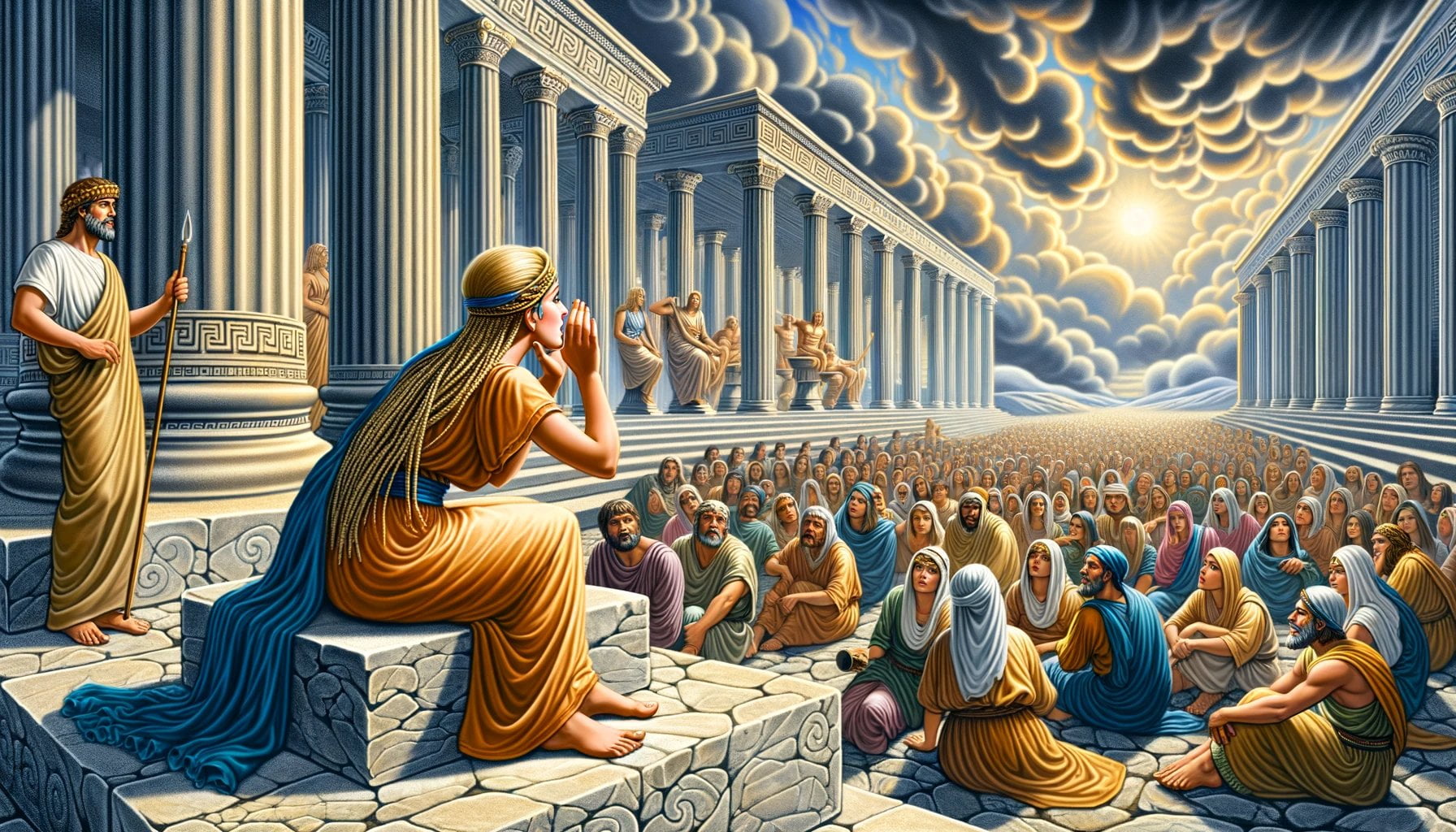Delving into the depths of ancient Greek civilization, we embark on a journey to unravel the enigma surrounding the fascinating world of prophetesses. These extraordinary women, gifted with supernatural abilities, held a significant place in the ancient Greek society. With their uncanny foresight and profound insights, they were revered as conduits through which the gods communicated with humanity. As we explore their powers and delve into the secrets of their rituals, we uncover a rich tapestry of ancient wisdom, offering a captivating glimpse into a world forgotten but forever influential.
Key Takeaways:
- Cassandra was a famous ancient Greek prophetess who was granted the ability to prophesy true prophecies by the god Apollo. However, she was cursed with the fact that her predictions would never be believed.
- The Oracle of Delphi was another significant figure in ancient Greek prophecy. The Pythia, the priestess of Apollo at Delphi, served as the mouthpiece of Apollo and delivered his oracles.
- Prophetesses played a crucial role in ancient Greek society as mediators between the gods and humans. They provided guidance and predictions for the future based on their ability to receive divine messages.
- The accuracy of the prophecies delivered by prophetesses held great significance and influenced important decisions made by individuals, cities, and even nations in ancient Greece.
- Greek divination encompassed various methods and practices, including Manteion, Psychomanteion, and chresterion. These forms of divination were often associated with specific gods and tied to specific locations.
- Despite facing challenges and skepticism, the accurate predictions of prophetesses like Cassandra and the Pythia influenced the course of events in Greek society.
Ancient Greek Prophetess: Exploring the Role and Significance of Prophetesses in Greek Mythology

1. Cassandra: The Tragic Prophetess of Greek Mythology
Cassandra, also known as Kassandra, was a Trojan priestess dedicated to the god Apollo. She possessed the remarkable ability to prophesy true prophecies, but there was a cruel twist. Apollo cursed Cassandra so that her predictions would never be believed, no matter how accurate they were.
Despite her accurate warnings of impending disaster, Cassandra’s prophecies were dismissed by those around her. Her tragic fate represents the dire consequences of unheeded warnings. Cassandra’s story serves as a cautionary tale, highlighting the importance of listening to those who can see what lies ahead.
2. The Oracle of Delphi: Pythia, the Female Prophetess
The Pythia, a priestess of Apollo at Delphi, held a central role in the Oracle of Delphi. She served as the mouthpiece of Apollo, delivering his prophecies to those who sought guidance.
Sitting on a tripod over a fissure, the Pythia inhaled the vapors rising from the depths, allowing her to enter a state of divination. Her prophecies were highly respected, and many sought her counsel before making important decisions. Kings, statesmen, and ordinary individuals turned to her for insight, believing her words to be a direct channel to the divine.
3. Role and Significance of Prophetesses in Greek Mythology
Prophetesses played a crucial role in ancient Greek society as mediators between the gods and humans. Their ability to receive divine messages and provide guidance and predictions for the future was highly revered.
The prophecies delivered by prophetesses held great significance and greatly influenced the decisions made by individuals, cities, and even nations. Their foresight had the power to shape the course of events and determine the fate of entire communities.
4. Greek Divination and the Practice of Prophecy
In ancient Greece, divination took various forms and was used as a means to gain insights into the future. Manteion, Psychomanteion, and chresterion were some of the common methods employed for divination (Greek divination – Wikipedia).
Prophetic powers were often associated with specific gods, such as Apollo or Zeus, who conveyed divine messages to prophetesses. These oracles and prophecies were sometimes tied to specific locations, such as Delphi, where the Oracle of Delphi resided.
Through divination, the prophetesses served as conduits for the divine, providing guidance and predictions that were sought after by those who sought a glimpse into the unknown.
The enigmatic world of ancient Greek prophetesses leaves a trail of intrigue and fascination. The powers they possessed and the influence they wielded continue to captivate the imagination. Cassandra, with her tragic fate, serves as a stark reminder of the consequences of ignoring the warnings of those who can see beyond the present. The Pythia, seated atop her tripod at Delphi, became a beacon of wisdom sought by both the common and the powerful.
Prophetesses held a pivotal role in ancient Greek society. They acted as the intermediaries between the mortal and divine realms, delivering prophecies that carried immense weight. Their abilities to glimpse into the future allowed them to shape the destinies of individuals, cities, and even nations.
In the realm of Greek mythology, the prophetess was both feared and revered. Their words, backed by divine influence, had the power to change the course of events. Their insights carried a weighty importance, ensuring that the role and significance of prophetesses in ancient Greece can never be overlooked.
Note: The above information is based on historical and mythological accounts and should be interpreted within the context of ancient Greek beliefs and mythology.
Did you know that ancient Greek queens held immense power and influence? Explore the fascinating lives of ancient Greek queens by clicking here.
Discover the intriguing and sometimes brutal ancient Greek punishment methods used during that time period. Unveil the secrets of ancient Greek punishment by clicking here.
Take a journey through time and uncover the various modes of transportation used in ancient Greece. Click here to learn about ancient Greek transportation.
Delve into the world of ancient Greek weaponry and explore the intricacies of ancient Greek daggers. Unearth the history of ancient Greek daggers by clicking here.
Famous ancient Greek prophetesses and their prophecies
As we delve into the mystical world of ancient Greek prophetesses, we uncover a realm of enigma and power. These visionary women served as conduits between the gods and humans, revealing glimpses of the future and providing guidance in crucial matters. Join me on this remarkable journey as we explore the lives, prophecies, and lasting impact of some famous ancient Greek prophetesses.
The Oracle at Delphi: Pythia, the Prophetess of Apollo
One of the most well-known and revered prophetesses in ancient Greece was Pythia, the Oracle at Delphi. Seated upon a tripod seat, she entered into a trance-like state by chewing bay leaves and drinking water from the sacred spring Kassotida. Her connection with the god Apollo allowed her to deliver prophecies to countless individuals seeking guidance. The prophecies of Pythia held immense influence, shaping the decisions of individuals, cities, and even nations.
Cassandra: The Trojan Priestess Cursed by Apollo
Beyond the Oracle at Delphi, another prominent figure emerges—Cassandra. As a Trojan priestess, she possessed the rare ability to make true prophecies, granted to her by Apollo. However, in a cruel twist of fate, Apollo cursed Cassandra so that no one would believe her predictions. Through her tragic story, we witness the significance of prophetesses and the consequences they faced when their prophecies went disregarded.
Tiresias: The Blind Seer
In the realm of myth and literature, the blind prophet Tiresias stands as an intriguing figure. With his ability to see beyond the physical realm, Tiresias played a significant role in Greek epic and tragedy. This prophet’s blind insight allowed mortals to communicate with the gods, often serving as a mediator between humanity and divine beings. His presence in ancient Greek lore highlights the importance of prophets and prophetesses in shaping the ancient world.
The Artistic Depiction of Prophetesses
Ancient Greek culture recognized the significance of prophetesses not only in literature but also in art. Countless sculptures and paintings depict these visionary women, immortalizing their role in society. One notable example is the statue found in the Temple of Zeus at Aizanoi, revealing the profound cultural impact of prophetesses and their enduring legacy.
The Perceived Role of Prophetesses in Christianity
Even beyond ancient Greece, the influence of prophetesses persisted. In Christianity, prophets are seen as individuals inspired by God to deliver messages to the faithful. This recognition of prophecy as a divine gift further emphasizes the enduring significance of these ancient Greek figures and their ability to shape the fabric of human history.
Key Takeaways:
- Prophetesses in ancient Greece, such as Pythia and Cassandra, played a crucial role in society as mediators between the gods and humans.
- The Oracle at Delphi, dedicated to Apollo, was the most famous ancient oracle known for delivering prophecies that influenced individual decisions and even city and nation-state policies.
- Cassandra, a Trojan prophetess cursed by Apollo, embodied the struggles of being disbelieved despite her accurate predictions.
- Blind prophet Tiresias acted as a conduit between mortals and gods in Greek literature and mythology, showcasing the importance of prophets in ancient Greek society.
- Prophetesses were not only revered in literature but also depicted in art and sculpture, further highlighting their cultural significance.
- Christianity recognizes the role of prophets, continuing the tradition of divine inspiration and message delivery.
Methods and Rituals Used by Ancient Greek Prophetesses
The enigmatic world of ancient Greek prophetesses is filled with captivating rituals and methods that allowed them to communicate with the divine. These mystic figures held immense power and influence within their respective societies, shaping the ancient world in profound ways. In this article, we will delve into the methods and rituals used by these prophetesses, unraveling the secrets behind their prophetic abilities and the cultural significance of their practices.
The Power of Rituals in Ancient Greece
Rituals played a crucial role in ancient Greek society, serving as a means of communication with the gods. These rituals aimed to achieve communal welfare, cohesion, and stability, and were deeply ingrained in all aspects of life. One common offering in these rituals was libations, which involved the ritual pouring out of a liquid as an offering to the gods. This could be watered-down wine, pure wine, honey, olive oil, water, or even milk. These libations, accompanied by prayers, were performed in honor of the gods and formed an integral part of formal rituals.
Animal Sacrifices and Divine Connections
Central to ancient Greek rituals was the act of animal sacrifice, often conducted within sanctuaries at altars in front of temples. These sacrifices were offered to the gods and were accompanied by elaborate ceremonies and prayers. The ritual act of sacrificing animals was believed to establish a connection between humans and the divine, enabling prophetesses to access the realm of prophecy. The blood of the sacrificed animals was considered sacred and served as a conduit for communication with the gods.
Divination for Seeking Knowledge and Guidance
In addition to animal sacrifices, divination practices were also employed by prophetesses to seek knowledge and guidance from the gods. Divination involved various methods, including Manteion, Psychomanteion, and chresterion. Manteion referred to the interpretation of signs and symbols, such as the flight patterns of birds or the examination of animal entrails. Psychomanteion involved the seeking of revelations through dreams or trances induced by certain rituals. Chresterion was the consultation of oracles or prophetesses who possessed the gift of prophecy.
Prophetesses as Conduits for the Divine
Prophetesses were regarded as mediators between the gods and humans, possessing the ability to channel the divine messages and insights. They were seen as conduits for the divine, providing spiritual guidance and predictions to those who sought insight into the future. The prophecies delivered by these prophetesses held great weight and influenced the decisions of individuals, cities, and even nations. One prominent example is Pythia, the Oracle of Delphi, who delivered prophecies to individuals seeking guidance, shaping their actions and decisions.
The Mystique of Ancient Greek Prophetesses
Ancient Greek culture recognized the importance of prophetesses, immortalizing their roles in society through literature and art. These women were highly respected for their prophetic powers and their ability to connect with the divine. While their rituals and methods may seem enigmatic to us today, they played a significant role in ancient Greece, offering a glimpse into the mysterious and influential world of prophetesses.
Key Takeaways:
– Rituals, such as libations and animal sacrifices, were important in ancient Greek society for communication with the gods.
– Divination practices, including Manteion, Psychomanteion, and chresterion, were used by prophetesses to seek knowledge and guidance.
– Prophetesses acted as conduits for the divine, delivering prophecies and providing spiritual guidance to individuals and communities.
– The power of prophetesses shaped the decisions of individuals, cities, and nations in ancient Greece.
– Ancient Greek culture recognized and immortalized the significant role of prophetesses in literature and art.
Sources:
– The Greeks and Their Rituals
– Ancient Greek Religion
The Legacy and Influence of Ancient Greek Prophetesses
The ancient world was filled with mysticism, and within the realm of ancient Greece, prophetesses held a unique and powerful role. These women, with their divine connection and prophetic abilities, shaped the course of history, leaving behind a lasting legacy. In this article, we will explore the captivating journey of ancient Greek prophetesses, unraveling their enigmatic powers, and understanding their profound influence on society.
The Mystical Powers of Prophetesses
The legacy of ancient Greek prophetesses is intertwined with the realm of mythology and religion. These women possessed the rare ability to communicate with the gods and receive prophecies that would guide the actions of individuals, cities, and even nations. Through rituals, prayer, and divination practices, prophetesses established a connection between the mortal world and the divine.
Prophetesses as Guardians of Wisdom
Ancient Greeks held a deep respect for the words of prophetesses, recognizing them as mediators between the gods and humans. The prophecies delivered by these women were highly esteemed, shaping the decisions of leaders and influencing the destiny of societies. Their wisdom was sought not only in times of crisis but also as a means to navigate the complexities of life.
The Revered Prophetesses of Ancient Greece
Among the most celebrated prophetesses of ancient Greece was Pythia, the Oracle of Delphi. Pythia, a priestess of Apollo, delivered prophecies to those who sought guidance at the temple of Delphi. Her cryptic verses, often requiring interpretation, guided individuals and shaped major events in Greek history.
Another notable prophetess was Cassandra, the Trojan priestess blessed with the gift of true prophecy. However, her tragic curse from Apollo ensured that her predictions would go unheard and unheeded, leaving her with the burden of knowing the future without the power to change it.
Ancient Greek Prophetesses in Literature and Art
The influence of prophetesses extended beyond their role in society, immortalized in literature and art. Their enigmatic presence can be found in Greek tragedies, epic poems, and sculptures that depict their divine connection and prophetic abilities. Ancient Greek culture recognized the significance of these women, emphasizing their essential role as messengers of the gods.
Key Takeaways:
- Ancient Greek prophetesses possessed extraordinary powers, connecting the mortal world with the divine and delivering prophecies that influenced the course of history.
- Their wisdom and guidance were highly respected, sought after by leaders and individuals alike.
- Pythia, the Oracle of Delphi, and Cassandra, the cursed prophetess, are among the most famous and revered figures in ancient Greek mythology.
- Prophetesses left a profound impact on literature and art, immortalizing their role in society and their powerful connection to the gods.

FAQ
Q1: Who were some famous ancient Greek prophetesses?
A1: Some famous ancient Greek prophetesses include Cassandra and the Pythia, the priestess of Apollo at Delphi.
Q2: What role did prophetesses play in ancient Greek society?
A2: Prophetesses played a crucial role as mediators between the gods and humans. They were believed to possess the ability to receive divine messages and provide guidance and predictions for the future.
Q3: Why were Cassandra’s prophecies not believed?
A3: According to Greek mythology, Cassandra was granted the ability to prophesy true prophecies but cursed with the fact that her predictions would never be believed.
Q4: How did the Pythia deliver prophecies at the Oracle of Delphi?
A4: The Pythia sat on a tripod seat over a fissure and inhaled vapors rising from the depths, entering into a trance state to deliver prophecies to those seeking guidance.
Q5: What was the significance of prophecies in ancient Greek society?
A5: The prophecies delivered by prophetesses often held great significance and influenced important decisions made by individuals, cities, and even nations. The accuracy of their predictions was highly valued, despite the challenges faced by some prophetesses in being believed.
- Mastering Leader in Spanish: The Complete Guide - April 19, 2025
- Uncovering Surprising Parallels: England Size Compared to US States - April 19, 2025
- Old Mexico Map: Border Shifts 1821-1857 - April 19, 2025
















